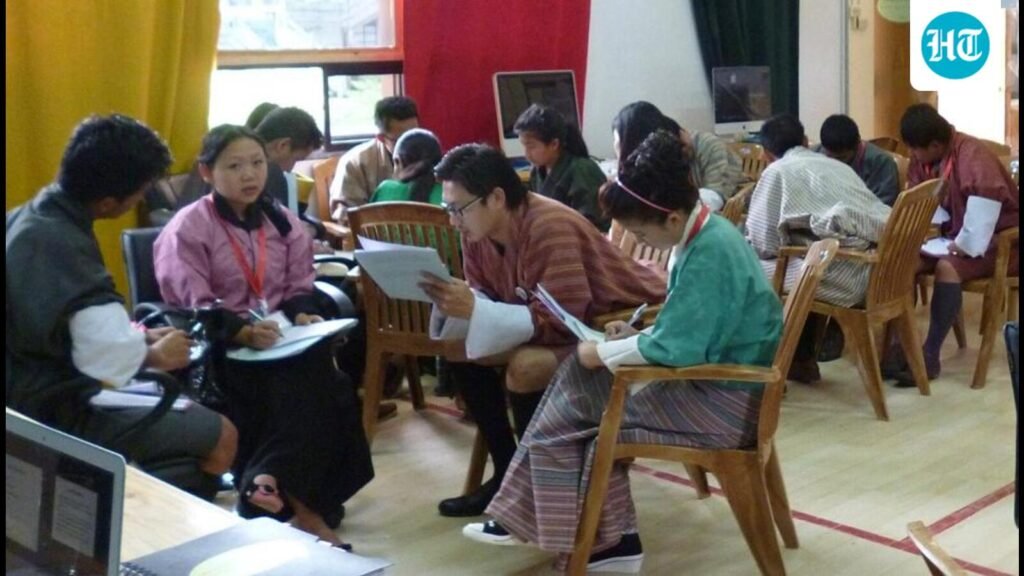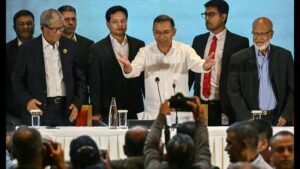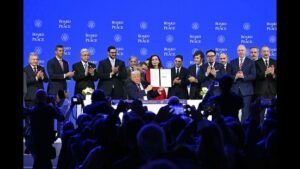
Prime Minister (PM) Narendra Modi’s latest visit to Bhutan — his fourth in 11 years — unfolded against the backdrop of the extraordinary Global Peace Prayer Festival, the largest gathering of its kind in the kingdom. The presence of the Sacred Piprahwa Relics from India lent the occasion a deep spiritual resonance. The visit was equally substantive: Three new memorandums of understanding (MoUs) were concluded, a fifth hydropower project inaugurated, and a 4,000-crore line of credit announced to advance Bhutan’s energy ambitions. The proposed rail links between the two countries signal an integration that aims to carry the partnership confidently into the future.

But beneath this, lies another unfolding story — that of a new, aspirational Bhutan led by a dynamic, tech-savvy king, quietly but steadily transforming the nation while keeping its traditional core intact.
At the heart of this transformation are Bhutan’s youth — young, aspirational, and increasingly outward bound. A World Bank report notes a sharp increase in emigration after borders reopened in 2022, with departures via Paro airport rising from less than 500 per month pre-Covid to more than 5,000 per month in early 2023, heavily skewed towards young, educated Bhutanese who were headed mainly to Australia. This is a staggering figure for a nation of just around 700,000 people. The sheer scale and momentum of this trend has turned youth emigration into an existential challenge — one that affects not only the economy, but also Bhutan’s cultural continuity, social fabric, and future leadership pipeline.
Much of the ongoing transformation, from building a modern economy to upgrading infrastructure and human capital, is being driven as a foil to this demographic drift. The message is clear: Let’s give the youth a reason to stay. Initiatives like the Gelephu Mindfulness City (GMC), education reform, and entrepreneurial upskilling are not just development projects, they are national acts of hope and confidence in Bhutanese youth. They aim to transform the country not only physically, but also emotionally by rekindling the belief that one can thrive in Bhutan and not have to leave it behind.
So what are the various initiatives shaping the Bhutan of today?
First, there’s the GMC project. The brainchild of Bhutan’s king, this is an extraordinary undertaking; remarkable both in its promise and its scale. The promise? A city that aims to reverse Bhutan’s brain-drain by building future oriented industries — wellness, education, technology, green energy, and culture — that create meaningful livelihoods at home. The scale? It will be spread across one million acres, spanning 11 village blocks and three districts — Gelephu as well as parts of Sarpang and Zhemgang.
The development will be phased — a multi-decade project — with the early stages focused on core infrastructure and the legal framework for its Special Administrative Region status. Work is already underway with the construction of the Gelephu International Airport that is projected to be one of the more significant airports in the sub-region. The announcement of rail links during PM Modi’s visit, connecting Gelephu and Samtse in Bhutan with the larger rail network of India, also augurs well and can speed up trade and tourism, transforming Gelephu and Samtse from fringe to hub.
Gyalsung, Bhutan’s mandatory national service, and Desuung, its voluntary counterpart, are two key youth-focused initiatives that reflect the country’s deeper commitment to nation-building.
Announced in 2019, Gyalsung is a one-year compulsory national service for all Bhutanese youth to enable them to “actualise their innate potential” and become productive, patriotic citizens. It stands on four pillars — military training, nation-building, academic and technical training and physical fitness, civic values and national identity. Importantly, this youth-centric initiative has moved steadily from promise to action: The first batch of Gyalsung trainees began training in 2024 and is expected to graduate later this year. A second cohort is now preparing to begin its training.
Desuung, launched in 2011, received a new lease of life during and after the Covid-19 pandemic. It is voluntary — unlike Gyalsung — has multi-age eligibility and is service-oriented. Its purpose? To instill a sense of duty, discipline, and volunteerism in Bhutan’s citizens, and to support national service in times of need. Over 45,000+ Desuups have been trained since 2011, including through specialized skilling programs in IT and coding, electricity work, plumbing, drone operation, renewables and energy entrepreneurship. Simply put, it is fully aligned with the new Bhutan and its quiet transformation. The orange-uniform Desuups were a visible presence throughout PM Modi’s recent visit, symbolizing compassion and courage to serve. Many Bhutanese take pride in serving as Desuups from time to time — including former PM Dasho Lotay Tshering, who famously donned the orange vest and volunteered during the Covid-19 pandemic.
Taken together, these two initiatives help knit the nation into a coherent and unified whole.
No less impressive is the value-add to Bhutan’s hydropower story. It is well known that Bhutan, in close collaboration with India, generates clean energy through hydropower and earns a steady stream of revenue from its exports. Nearly 40% of Bhutan’s national revenue is derived from hydropower sales to India, making it a cornerstone of the country’s economy. Five successful hydro-electric power projects define India-Bhutan collaboration in this key sector. But, since 2019, Bhutan has gone beyond, using the surplus hydropower to mine cryptocurrencies. With five centers established across the country and the estimated mined value exceeding a billion dollars, this initiative represents a strategic move to diversify and strengthen Bhutan’s revenue base, while aligning with broader national goals of self-reliance and sustainable growth.
The nation is also pushing solar at scale. A MoU on renewables was signed with India on November 11. Last year, an agreement between Reliance Power and a Bhutanese State-owned enterprise had been announced, with the goal of building a 500-MW solar project — the country’s largest — at an estimated cost of nearly 2,000 crores. The government of Bhutan has also launched a National Solar Energy Roadmap, with the International Solar Alliance providing technical and financial support to accelerate deployment.
The progress in education has also been noteworthy. Bhutan Baccalaureate (BB) has been rolled out in 23 select pilot schools across the country. Its emphasis on a competency- and values-based framework that tries to produce “persons of substance”, not just exam-toppers, is key. It replaces the earlier system which was modeled after India’s CBSE, especially at the secondary and higher secondary levels. The king’s famous quote that education must empower our children to think deeply, act responsibly, and lead meaningfully — not just pass exams — holds special meaning here.
The quality of the program has already impressed, with the World Bank treating BB as an exportable idea. By all accounts, this goes beyond polite interest — the Bank is amplifying and platforming BB as an innovation and helping market it through South-South learning. The short point: Bhutan now defines its own learning goals based on Gross National Happiness and national needs.
Another bold (and strategic) initiative led by the king was civil-service reform, initiated in 2022. The aim is not just administrative efficiency but a transformation of values, mindset and delivery. The structural reform has been completed in 2025, even as cultural and performance reforms are ongoing, especially in how service is delivered at the district and village bloc level. Clearly, the civil service is now part of the ongoing national transformation and not just a bureaucratic machine.
Added to this is the deep-rooted Buddhist culture of Bhutan, which shapes the people’s natural disposition toward peace, compassion, and contentment. These values are not abstract ideals; they are lived daily, forming the social fabric of a society grounded in patience, discipline, and coherence. Bhutanese culture has long done things in its own way — honoring tradition while embracing growth, progress, and values-based development in a uniquely Bhutanese rhythm.
Crucially, religion in Bhutan is not separate from public life. It is a pillar of national identity, a guide for ethical living, and a quiet force behind policies that prioritize well-being over mere economic gain. In this light, Gross National Happiness has evolved from a static policy slogan into a dynamic, forward-looking vision, one that increasingly informs Bhutan’s development pathways with a blend of spiritual wisdom and modern aspiration.
A final word. The Bhutan of today has deliberately chosen not to invite large-scale industries, recognizing that such models may not align with its values or serve its youth meaningfully. Instead, the country follows a philosophy of slow, steady development, progressing at its own pace, with a focus on dignity, sustainability, and self-reliance. Even in tourism, Bhutan has opted for quality over quantity, welcoming visitors who genuinely appreciate its culture, spirituality, and natural beauty. The success of this approach is evident: In 2024, Bhutan received over 145,000 visitors — a 41% rise from the previous year — and the upward trend continues in 2025. The numbers speak for themselves.
In all these aspects and more, India’s imprint is unmistakable. PM Modi’s recent visit was deeply appreciated — from the powerful symbolism of the Piprahwa relics displayed at the Global Peace Prayer Festival to the PM’s personal presence at the international celebration of the Buddhist faith, despite a terror attack in India on the eve of his visit. This point was noted by Bhutan’s king in the course of his address at the Changlimithang Stadium on November 11 — a point also made repeatedly in the public domain by the media.
The bottom line is that India stands with the new Bhutan just as it did with the old. As Bhutan transforms, the friendship only deepens anchored in the “three mutuals” of interest, respect, and sensitivity.
Ruchira Kamboj is former representative of India to the UN, New York. The views expressed are personal




